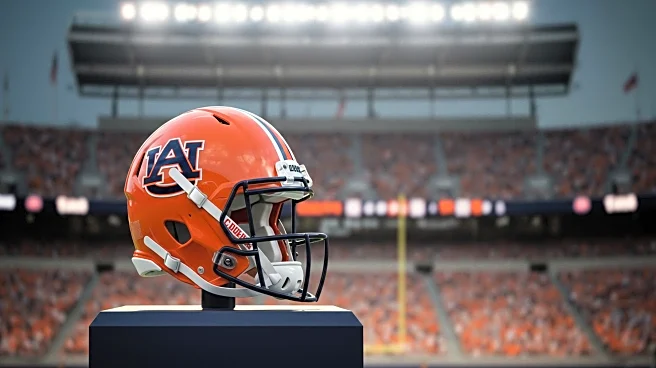What's Happening?
Auburn University has announced the retirement of Cam Newton's No. 2 jersey, commemorating his exceptional contributions during the 2010 season. Newton, who led Auburn to a national championship and won the Heisman Trophy, will have his jersey retired in a ceremony on October 11 during Auburn's game against Georgia. This honor places Newton alongside other Auburn legends such as Pat Sullivan, Bo Jackson, and Terry Beasley, whose jerseys have also been retired. Newton's 2010 season was marked by his record-breaking performance, becoming the first SEC player to achieve over 2,000 passing yards and 1,000 rushing yards in a single season, culminating in a 14-0 record and a national title victory against Oregon.
Why It's Important?
The retirement of Cam Newton's jersey is a significant recognition of his impact on Auburn's football legacy and the broader college football landscape. Newton's achievements during the 2010 season not only brought national attention to Auburn but also set a new standard for quarterback performance in the SEC. His ability to excel in both passing and rushing redefined the expectations for quarterbacks in college football. This honor underscores the lasting influence of Newton's collegiate career, which paved the way for his successful transition to the NFL, where he continued to break records and earn accolades, including the NFL MVP award in 2015.
What's Next?
The jersey retirement ceremony is expected to be a momentous occasion, drawing attention from fans, alumni, and sports enthusiasts. It will likely reinforce Auburn's reputation as a nurturing ground for exceptional talent and could inspire current and future players to strive for excellence. The event may also prompt discussions about the legacy of other notable players and the criteria for jersey retirements in college sports. As Auburn celebrates Newton's contributions, the ceremony could serve as a catalyst for further engagement with the university's athletic programs.
Beyond the Headlines
Cam Newton's jersey retirement highlights the cultural and emotional significance of sports achievements in collegiate settings. It reflects the deep connection between athletes and their alma maters, where individual accomplishments contribute to the collective identity and pride of the institution. This event may also spark conversations about the role of sports in shaping personal and community narratives, as well as the enduring impact of athletic success on university traditions and alumni relations.









